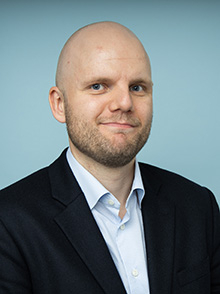– What are the most important aspects of your job?
– “To analyse how international political and economic trends affect Norwegian trade and industry. It might involve how a future regime change abroad affects the framework conditions of a Norwegian factory in the country in question, or more specifically the type of risks the factory may face in relation to local trade and industry.”
– What do you like best about your job?
– “The wide range of topics and problems that I have to deal with. When I was a master’s student, I thought I was born to specialise in a niche topic that lengthy academic assignments allow you to do. That was until I was faced with a number of other tasks that required me to apply my study skills in completely new ways, just as I am doing in my current job.”
– In what ways are the studies offered by the Faculty of Humanities relevant to your job?
– “The wide range of topics and problems that I have to deal with. When I was a master’s student, I thought I was born to specialise in a niche topic that lengthy academic assignments allow you to do. That was until I was faced with a number of other tasks that required me to apply my study skills in completely new ways, just as I am doing in my current job.”
– What is the best advice you can give new students who are thinking about job opportunities after completing their studies?
– “Get an overview of the topics the researchers and lecturers on your programme of study are working on. There is often a large breadth of subject areas – perhaps you will find a topic that you would like to write a bachelor’s or master’s thesis about? It can be quite lonely writing lengthy academic assignments, so it can be a real advantage knowing who else on the programme of study might be academically interested in discussing your topic. If you are lucky, it might help raise the level of your assignment, make you better at communicating the topic you are working on and placing your niche project into a larger academic context. In my experience, employers outside of academia are more interested in knowing how you can apply your expertise in different contexts rather than hearing about the details of your master’s thesis.
I would never have learned Arabic well if I hadn’t spent as much time as I could on student exchanges. It is something I would recommend to anyone wanting to specialise in a language. I believe that foreign languages only become valuable in a work context when you master them at a well-functioning level, and that takes time and dedication.
Henrik Buljo Anstorp
Subject:
Asia and Middle East Studies
Specialisation:
Middle East Studies
Degree:
Master's
Graduated:
2020
Position:
Analyst
Employer:
KPMG (kpmg.com/no/nb/home)
